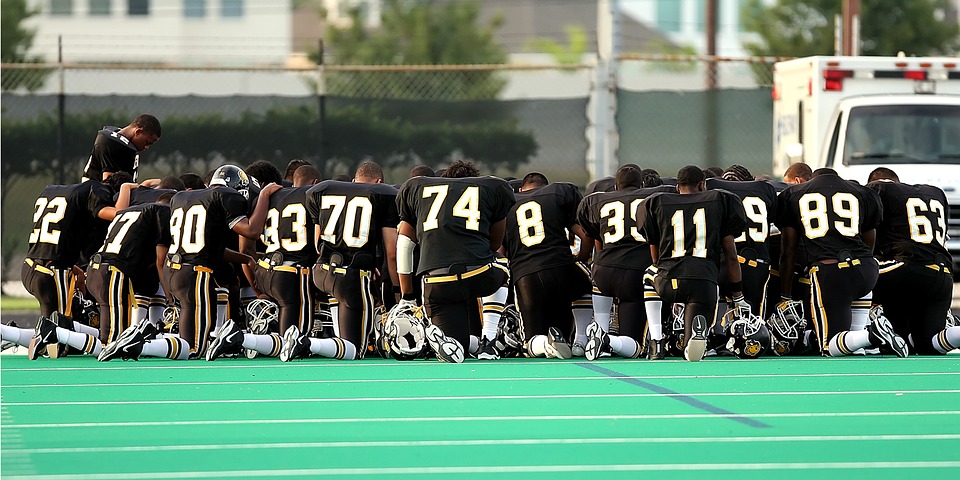


In case you have been under a rock for the past month, you have heard about the controversy over Colin Kaepernick’s decision to take a knee during the singing of the national anthem. I am one of those women who learned about football as a little girl sitting on her father’s lap, so I already knew he is the quarterback of the San Francisco 49ers, and understood that his refusal to participate in this longstanding ritual of NFL liturgy was going to raise all kinds of opposite of heaven. You can hear him explain why here.
Needless to say, the backlash has been epic. But why? Does he not have the right to exercise his First Amendment rights? The First Amendment is the right to free speech and the right to peacefully protest. According to the laws that govern this country, if Colin Kaepernick does not want to stand for the national anthem, he has the right not to. He has every right to peacefully protest a song that offends him. Maybe a little history about that song is warranted. Francis Scott Key, the man who wrote it, was a slaveholder and an attorney who fought to stifle abolitionists. A case can be made that the third stanza of “The Star Spangled Banner” actually celebrates the death of slaves. Click here for more about that.
So what should the Christian response to Colin Kaepernick be? Should we support him, as many veterans have in the Twitter thread #VeteransForKaepernick? Or are Christians supposed to abandon themes of patriotism altogether? And what exactly does that look like for those Americans who have been treated more like guests of America than citizens of America with full rights and privileges?
There is a recurring theme throughout the Bible about how we treat others; the treatment of the alien/foreigner/other was taken quite seriously. In the New Testament, Jesus uses the parable of the Good Samaritan as a primer on how to treat others. When Jesus talks about a “good” Samaritan, it would have been heard by its first hearers much the same way southern blacks during the Civil Rights Movement might have heard the “good” klansman. I believe Jesus uses this illustration intentionally, to trigger a visceral response from anyone listening to him. The ancient Jews and Samaritans had contention so severe they lived in different territories and avoided social contact. Now think about how the Civil Rights Movement of the 1950s and 1960s was started by the Christian witness of Black men, women and children who had had quite enough of the lynchings without trial of their loved ones and their neighbors. Think about being threatened with violence for attempting to vote. Think about police using fire hoses and dogs on American citizens. Think about the kidnapping and murder of Emmett Till and the image of his deformed and mutilated fourteen-year-old body in that casket. Think about Black businesses being burned to the ground in midnight raids by the Ku Klux Klan. Now revisit my notion about the ‘good’ klansman. I believe Jesus meant to stir up the same feelings you might have just felt just now, deep down in your solar plexus. Perhaps these are the same feelings Colin Kaepernick felt when he described his feelings about unarmed Black people killed by the police.
For a lot of people, Kaepernick’s decision to not stand for the national anthem was as discomfiting as I imagine the lawyer was when Jesus’ reply to his query about what to do to inherit life was answered with the parable of the Good Samaritan (Luke 10: 25-36). The Good Samaritan’s actions were patriotic in that he is being a neighbor to someone who probably can’t stand him. If Jesus told this today using the good klansman analogy it might look something like the images here. These images is of a black woman using her body to shield a white man wearing a shirt with the confederate flag emblazoned upon it from an angry crowd are powerful. What if this is the Christian response to Colin Kaepernick? When the Rev. Dr. Martin Luther King got involved in the Civil Rights Movement, he was concerned about matters of social justice and his use of nonviolent methods and practices cannot be separated from his Christian beliefs. King had a vision for how society should be:
“At the heart of all that civilization has meant and developed is “community” – the mutually cooperative and voluntary venture of man to assume a semblance of responsibility for his brother.” (MLK in 1963 speaking about “The Ethical Demands of Integration.”)
King’s vision focused on a community of love and justice. A beloved community. This ideal runs throughout his speeches and sermons. If there is a Christian response to patriotism, I think this is it. If we love our country, it means we love our neighbors. ALL of them. And when a particular segment of our beloved community is being mistreated, we stand for them like this woman above, who used her own body to shield someone who probably could not stand her; not to harm him, but to protect him. She protected his right to take a stand. Colin Kaepernick is also taking a stand based on what he sees as part of his community being mistreated. I think Jesus would be okay with that.
When the lawyer asked Jesus, “who is my neighbor?” Jesus responds by telling a parable that could easily be summarized as the good Samaritan: looking out for and looking after someone who got hurt out here in these streets. I should point out that the term ‘lawyer’ is not as we might think of it today. This was not a case of Jack McCoy from “Law and Order” asking Jesus what he must do to inherit eternal life. A lawyer in ancient Palestine would be understood as someone who was an expert of the Law, the Law being the Torah, what we know as the first five books of the Bible. I detect a hint of snark in Jesus’ response to him, “what is written in the law? What do you read there?” This is similar to any query put to your mother and her response to you began with, “you know good and well….” This lawyer would have known good and well what is in the law. He is trying to show himself as righteous to Jesus by suggesting that just by knowing the law, he has fulfilled his neighborly duty. Jesus realizes this and yanks the slack right out of him with this parable that discloses it was the Samaritan that demonstrated patriotism. It was the Samaritan that fulfilled his neighborly duty. The Samaritan looked out for his neighbor, no matter what his ethnic difference was. He loved his neighbor as himself. Can you be a patriot if you have no love for your neighbor? The parable of the good Samaritan suggests the simple act of proclaiming the words of the law, “You shall love the Lord your God with all your heart, with all your soul, and with all your strength, and with all your mind; and your neighbor as yourself” (Luke 10:27), did not in and of itself clear a path to eternal life. Nor does reciting the words of the national anthem make you a patriot. Jesus might argue, as the parable suggests, that your actions might have a bit to do with it. The parable of the Good Samaritan suggests that your neighbor is anyone who needs you. I know the NFL has its own share of problems and hypocrisies, particularly when it comes to matters of social justice. But it is worth noting that Colin Kaepernick plans to donate to $1 million of his salary to charity.
I don’t remember which theologian said it, but something I read of his stuck with me: if you drew a line separating the oppressed from the oppressors, Jesus would be on the side of the line with the oppressed. Maybe even taking a knee.
thanks for penning this. Your final comment may be from liberation theology/black liberation theology.
It is Hugh L. Hollowell!